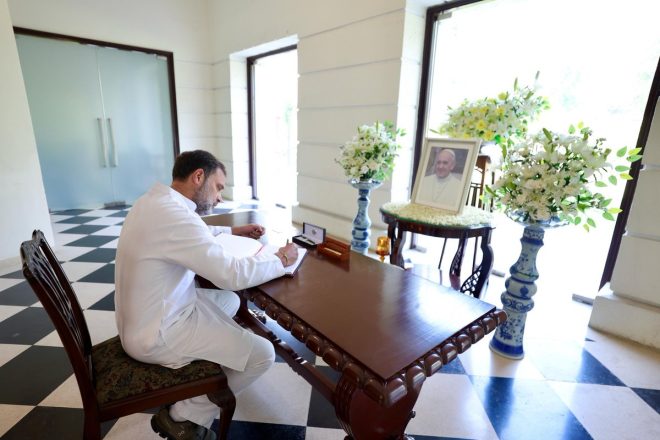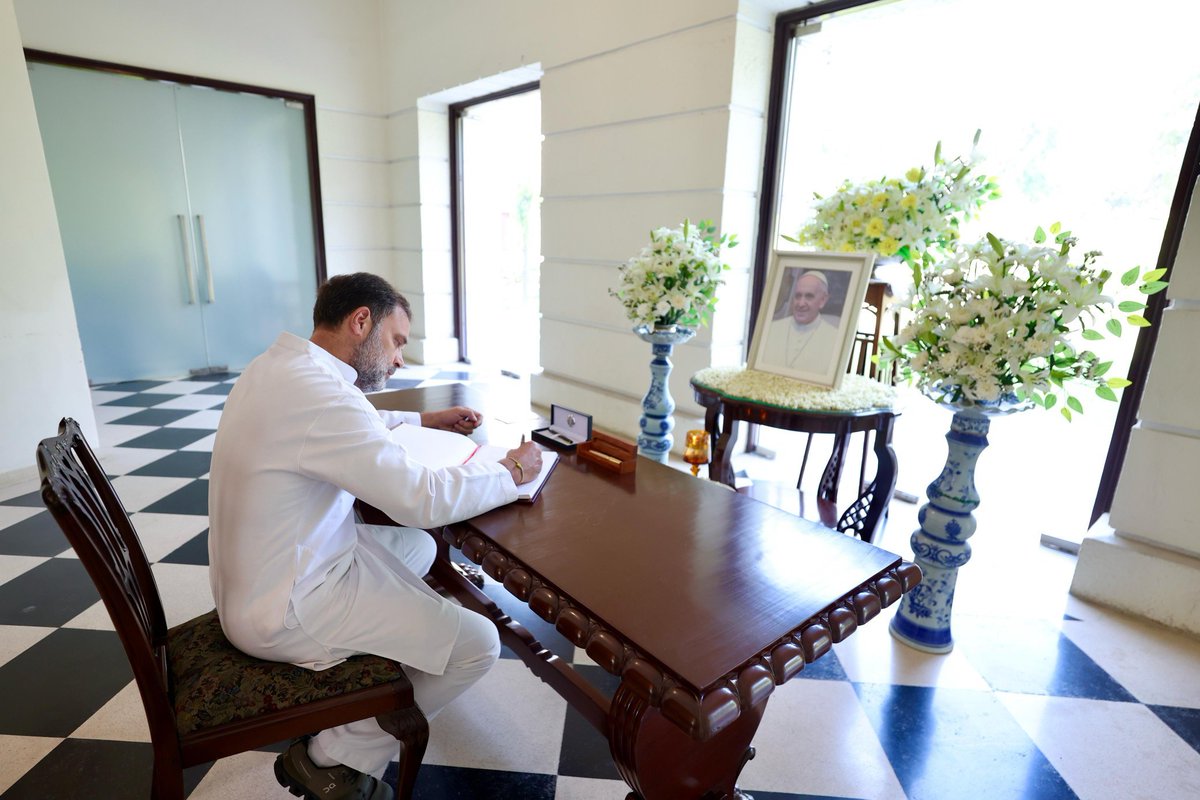
Death- Obituary news
Rahul Gandhi Offers Condolences on the Passing of Pope Francis
On April 25, 2025, Indian politician Rahul Gandhi made a significant visit to the Apostolic Nunciature in New Delhi to express his heartfelt condolences on the passing of His Holiness Pope Francis. This visit highlights the interconnectedness of global religious communities and the respect that leaders hold for one another, regardless of their differing backgrounds.
Significance of the Visit
Rahul Gandhi’s visit to the Apostolic Nunciature, the diplomatic mission of the Holy See in India, underscores the importance of interfaith dialogue and respect among different religious denominations. As a prominent political figure and a member of the Indian National Congress, Gandhi’s gesture reflects not only his personal respect for Pope Francis but also a broader commitment to fostering peace and unity in a diverse society.
The Apostolic Nunciature serves as a crucial link between the Vatican and the Catholic Church in India, making Gandhi’s visit particularly symbolic. By paying his respects, he acknowledges the Pope’s role in promoting values of compassion, tolerance, and understanding across cultural and religious divides.
- YOU MAY ALSO LIKE TO WATCH THIS TRENDING STORY ON YOUTUBE. Waverly Hills Hospital's Horror Story: The Most Haunted Room 502
Meeting with Archbishop Dr. Leopoldo Girelli
During his visit, Rahul Gandhi also paid a courtesy call on His Excellency Archbishop Dr. Leopoldo Girelli, the Apostolic Nuncio to India and Nepal. This meeting provided an opportunity for discussions on various topics, including the impact of the Pope’s teachings in India and the role of the Catholic Church in promoting social justice and community welfare.
The interaction between Gandhi and Archbishop Girelli signifies the ongoing collaboration between political and religious leaders in addressing pressing societal issues. It highlights the Church’s involvement in charitable activities and its commitment to social issues, which resonate with Gandhi’s own political ideals centered around empowerment and support for marginalized communities.
The Legacy of Pope Francis
Pope Francis, who served as the head of the Roman Catholic Church from 2013 until his passing in 2025, was widely recognized for his progressive stance on various global issues. His advocacy for climate change awareness, interfaith dialogue, and social justice has left an indelible mark on both religious and secular communities worldwide.
By acknowledging the Pope’s contributions, leaders like Rahul Gandhi help to perpetuate the values that Pope Francis championed during his lifetime. This visit serves not only as a moment of mourning but also as a call to action for individuals and communities to continue the work that the Pope so passionately endorsed.
Importance of Interfaith Respect in Today’s World
In an era marked by division and conflict, Gandhi’s visit to the Apostolic Nunciature serves as a powerful reminder of the importance of interfaith respect and cooperation. By reaching out to the Catholic community in India, he sets an example for other leaders to follow, fostering an environment where mutual respect can thrive.
The role of political figures in engaging with religious communities is crucial in promoting peace and understanding. Such gestures can pave the way for collaborative efforts in tackling issues like poverty, inequality, and climate change, which require a united front from all sectors of society.
Conclusion
Rahul Gandhi’s visit to the Apostolic Nunciature in New Delhi to offer condolences on the passing of Pope Francis is a poignant reminder of the interconnectedness of faith and politics. It illustrates the significance of recognizing and honoring the contributions of global leaders who have dedicated their lives to promoting peace, compassion, and social justice.
As the world navigates through complex challenges, the values embodied by leaders like Pope Francis continue to resonate. Gandhi’s respectful acknowledgment of the Pope’s legacy not only honors the memory of a significant religious figure but also reinforces the need for ongoing dialogue and cooperation across cultural and religious lines. Through such actions, leaders can inspire their followers to work toward a more harmonious and equitable world.

Sh @RahulGandhi visited the Apostolic Nunciature in New Delhi & offered his heartfelt condolences on the passing of His Holiness Pope Francis.
During the visit, he also paid a courtesy call on the Apostolic Nuncio to India g Nepal, His Excellency Archbishop Dr. Leopoldo Girelli. pic.twitter.com/ZtMWvYtpBt
— Odisha Congress (@INCOdisha) April 25, 2025
Sh @RahulGandhi visited the Apostolic Nunciature in New Delhi & offered his heartfelt condolences on the passing of His Holiness Pope Francis
On April 25, 2025, a significant moment unfolded when Sh @RahulGandhi visited the Apostolic Nunciature in New Delhi. This visit was not just a formality; it was a heartfelt gesture of solidarity and respect following the passing of His Holiness Pope Francis. The news of Pope Francis’s demise stirred emotions worldwide, and for many, Gandhi’s visit served as a symbol of hope and unity in these trying times.
Understanding the Apostolic Nunciature
The Apostolic Nunciature is the diplomatic mission of the Holy See, and it plays an important role in fostering relationships between the Vatican and countries across the globe. In India, the Apostolic Nunciature serves as a vital link for various religious, diplomatic, and cultural engagements. This institution not only represents the Pope but also embodies the values of compassion, understanding, and peace that the Catholic Church stands for.
Rahul Gandhi’s Gesture of Condolence
During his visit, Gandhi expressed his condolences to the Apostolic Nuncio, His Excellency Archbishop Dr. Leopoldo Girelli. This meeting was not merely a diplomatic formality; it represented a deep sense of respect for the Catholic community and the values Pope Francis championed throughout his papacy. Gandhi’s gesture resonates with many, reflecting a shared grief in the loss of a leader who emphasized love, tolerance, and inclusion.
Pope Francis: A Legacy of Compassion and Dialogue
Pope Francis, known for his approachable demeanor and commitment to social justice, had a profound impact on millions around the world. His teachings on climate change, poverty, and the need for interfaith dialogue have left a lasting legacy. By visiting the Apostolic Nunciature, Gandhi acknowledges not only the Pope’s contributions but also the values that unite us as human beings regardless of our faith.
Significance of the Courtesy Call on Archbishop Dr. Leopoldo Girelli
The courtesy call on Archbishop Dr. Leopoldo Girelli was another important aspect of Gandhi’s visit. Engaging with the Apostolic Nuncio was a way to strengthen the ties between the Indian government and the Catholic Church, fostering mutual respect and cooperation. This relationship is crucial for addressing social issues, promoting peace, and enhancing inter-religious dialogue in a diverse nation like India.
The Response from the Community
Gandhi’s visit garnered attention and praise from various segments of society. Many saw it as a unifying act during a time of mourning. The Catholic community, in particular, appreciated the gesture, recognizing it as a sign of solidarity from a prominent political leader. The reaction on social media platforms highlighted how moments like these can bridge divides and foster a sense of community in times of grief.
Shaping the Future of Interfaith Relations
The meeting between Sh @RahulGandhi and Archbishop Dr. Leopoldo Girelli has broader implications for interfaith relations in India. As the country continues to grapple with various socio-political challenges, leaders like Gandhi are taking steps to promote dialogue and understanding among different religious communities. This visit is a reminder that compassion and mutual respect can lead to positive societal change.
Reflections on Leadership and Empathy
In an age where political discourse can often be divisive, Gandhi’s actions serve as a beacon of hope for many. His visit to the Apostolic Nunciature highlights the importance of empathy in leadership. By expressing condolences and engaging with faith leaders, Gandhi demonstrates that political leaders can take a stand for compassion and unity, which is essential for a healthier political landscape.
What This Means for Future Political Engagements
Gandhi’s visit also sets a precedent for future political engagements with religious institutions. In a country as diverse as India, it is crucial for leaders to engage with various religious communities to foster a sense of belonging among all citizens. This approach not only strengthens democracy but also enhances social cohesion, making it easier to address pressing issues collaboratively.
The Role of the Apostolic Nunciature in India
The Apostolic Nunciature’s role extends beyond mere diplomacy. It acts as a facilitator of dialogue between different faiths, helping to alleviate tensions and promote peace. By engaging with leaders like Rahul Gandhi, the Nunciature can continue to champion the values of compassion and understanding that Pope Francis advocated.
Looking Ahead: The Path of Unity
In the wake of Pope Francis’s passing, the future of interfaith dialogue in India will be crucial. Leaders like Sh @RahulGandhi have the opportunity to shape the narrative around religious tolerance and cooperation. By continuing to engage with faith leaders and communities, they can pave the way for a more united and harmonious society.
Conclusion: A Moment of Reflection
Sh @RahulGandhi’s visit to the Apostolic Nunciature in New Delhi was more than just a diplomatic gesture; it was a heartfelt expression of condolences that reverberated across communities. As we reflect on this moment, it serves as a reminder of the importance of compassion, dialogue, and unity in our increasingly fragmented world. The legacy of Pope Francis will continue to inspire leaders and individuals alike to work towards a better future, one where understanding and empathy reign supreme.
“`
